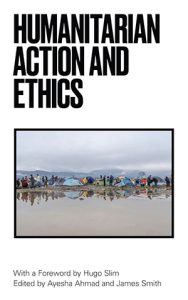Humanitarian Action and Ethics

Editor(s): Ayesha Ahmad & James Smith
Publisher: Zed Books
Year of Publication: 2018
Print Length: 336 pages
Genre: Non-Fiction / Social Science, Political Science
Area: Haiti, South Sudan, Syria, Iraq, Europe, The United Kingdom (UK), France, Palestine/Israel, Demoractic Republic of Congo (DRC)
Topic: Humanitarian Action & Humanitarianism, Humanity, Ethics & Morality, Social/Aid Workers, Medicine & Healthcare, Care, Organization, Non-Profit Organization (NGO), Refugees & Forced Migration, Migration, Globalization, Lived Experience, Gender-based Violence, Volunteer Tourism, Neoliberalism
From natural disaster areas to conflict zones, humanitarian workers today find themselves operating in diverse and difficult environments. While humanitarian work has always presented unique ethical challenges, such efforts are now further complicated by the impact of globalization, the escalating refugee crisis, and mounting criticisms of established humanitarian practice.
Featuring contributions from humanitarian practitioners, health professionals, and social and political scientists, this book explores the question of ethics in modern humanitarian work, drawing on the lived experience of humanitarian workers themselves. Its essential case studies cover humanitarian work in countries ranging from Haiti and South Sudan to Syria and Iraq, and address issues such as gender based violence, migration, and the growing phenomenon of ‘volunteer tourism’. Together, these contributions offer new perspectives on humanitarian ethics, as well as insight into how such ethical considerations might inform more effective approaches to humanitarian work.
Table of Contents
Acknowledgements
Contributor Biographies
Foreword: Humanitarian Action and Ethics – Hugo Slim
Foreword: On the Front Lines of Humanitarian Medical Ethics – Vickie Hawkins and Paul McMaster
Introduction: Narrating Humanitarian Action and Ethics — Ayesha Ahmad
1. Difficult Decision-making, Compromise, and Moral Distress in Medical Humanitarian Response — James Smith
2. Moral Entanglement and the Ethics of Closing Humanitarian Projects — Matthew Hunt & Jingru Miao
3. The Outsider’s Role: Ethical Reflections from the Study of International-National Staff Relations in Development and Humanitarian Organisations — Maëlle Noé
4. The Moral Motivation of Humanitarian Actors — Katarina Komenská
5. Makeshift Humanitarians: Informal Humanitarian Aid Across European Close(d) Borders — Elisa Sandri & Fosco Bugoni
6. Amateur Humanitarianism, Social Solidarity and ‘Volunteer Tourism’ in the EU Refugee ‘Crisis’ — Jane Freedman
7. La Nouvelle France: Institutionalised Abuse, ‘Exception’ and Spectacle in the Exiled/Volunteer Relationship at the Franco-British Border — Celeste Cantor-Stephens
8. Ethical Challenges Among Humanitarian Organisations: Insights from the Response to the Syrian Conflict — Kory L. Funk, Diana Rayes, Leonard S. Rubenstein, Nermin R. Diab, Namrita S. Singh, Matthew DeCamp, Wasim Maziak, Lara S. Ho, and W. Courtland Robinson
9. Home and Away: Ethical Issues in Humanitarian Aid to Syrians in Israel — Schlomit Zuckerman, Morshid Farhat and Salman Zarka
10. The Emergence of Humanitarian Failure: The Case of Haiti — Jan Wörlein
11. Ethical Encounters as a Humanitarian Psychiatrist — Peter Hughes
12. One for All, or All for One: The Ethical Implications of Individual Human Rights-based and Public Good-based Frameworks in Emergency Mental Health — Liyam Eloul and Claire F. O’Reilly
13. Ethics of Cultural Concepts and Conflicts Surrounding Disclosure of Gender-based Violence in Humanitarian Settings — Ayesha Ahmad
14. The Invisible Man: The Shrouding of Ethical Issues Related to Sexual Violence Against Men in the Humanitarian Response in the Democratic Republic of Congo — Vanessa Okito Wedi
15. Humanitarian Ethics in Médecins Sans Frontières/Doctors Without Borders: Discussing Dilemmas and Mitigating Moral Distress — Rachel Kiddel-Monroe, Carol Devine, John Pringle, Sidney Wong and Philippe Calain
16. Stop Missing the Point: Managing Humanitarian Action Well — Caroline Clarinval
17. An Ethic of Refusal: The Political Economy of Humanitarianism Under Neoliberal Globalisation — John Pringle and Toby Leon Moorsom
Afterword: The Ethics of Compiling a Book on Humanitarian Ethics — James Smith

Ayesha Ahmad holds a PhD in medical ethics and works to integrate ethics and the humanities into global health research and pedagogy. Her research expertise is in transcultural psychiatry and cross-cultural mental health. She particularly work in contexts of conflict and humanitarian crisis resulting from disasters including environmental change. She develops trauma therapeutic interventions using traditional storytelling and has an ongoing research project in Kashmir (India) and Turkey, in collaboration with Afghanistan, Tunisia, and South Africa; www.shaercircle.com
Source: https://www.sgul.ac.uk/profiles/ayesha-ahmad
More from Ayesha Ahmad in this library, click here.

James Smith is a British physician with degrees in Global Health and Development, Medical Anthropology, and International Humanitarian Affairs. He maintains an honorary research fellowship with the Health in Humanitarian Crises Centre at the London School of Hygiene & Tropical Medicine (LSHTM). He works as Humanitarian Affairs Advisor for MSF and has worked for MSF’s Research Unit on Humanitarian Stakes and Practices (UREPH) in Geneva, as an advisor with MSF OCBA’s Patient Safety and Dignity Initiative, and as a researcher with MSF’s Access Campaign. His interests include humanitarian ethics, evidence-based humanitarian response, the intersection between migration and humanitarian action, policing and state violence, and aspects of global health governance.
Source: https://rli.sas.ac.uk/people/dr-james-smith
More from James Smith in this library, click here.
